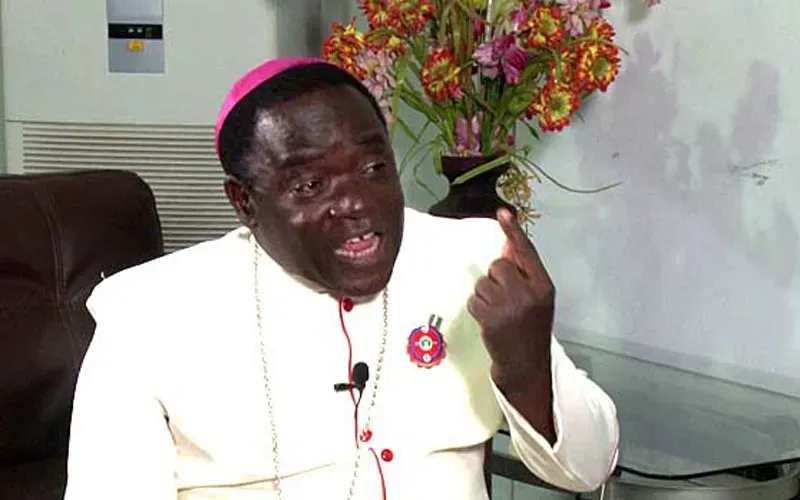“How much is too much and how small is too small? Successive uncaring governments have created the conditions under which Nigerians are now suffocating,” the Catholic Church leader laments.
Most Nigerians are opting to leave the country not because it is safer but because the leaders in their native country have created a situation that is uncertain for the people, he says.
The Nigerian Bishop who was appointed as a member of the Vatican Dicastery for Promoting Integral Human Development in January 2021 notes that poor leadership is responsible for the disunity that is being experienced in the West African country and that most Nigerians are seeking new identities because of “frustration”.
“What we are witnessing by way of a surge in ethnic, religious, cultural, class, social forms of consciousness are the manifestation of the symptom of that frustration,” Bishop Kukah says, and continues, “It is within this context that we must locate the screechy cries of marginalization, oppression, injustice, and so on.”
In his February 23 message, the 69-year-old Bishop says attacks leveled against him by his “enemies” are due to his stand on state issues.
(Story continues below)
“I have often been accused by my enemies of being political,” he says, and adds in reference to those who have accused him, “They say I am a politician in cassock. I actually like it when they say that because at least, it means that I have never taken the easy part of pretending to be neutral.”
Bishop Kukah further says that rebellion by the citizens towards the state shows that the people have been disappointed by the government.
“The rise in rebellion against the state is the result of the abandonment of citizens by its leaders,” he says.
Speaking about the dangers of failed public institutions, the Catholic Bishop says such situations always brew the rule of engagement, which he referred to as, “bandit mantra,” or “everyone for himself and God for us all.”
Bishop Kukah says that public institutions decay and start losing focus the moment public goods are not distributed equally.
“When public goods are not evenly shared, certain groups begin to develop a skewed sense of entitlement while others squirm or revolt against the system, institution, community or even nation,” he says.
He adds in reference to unequitable sharing of public goods, “It facilitates the decay in public institutions which become a den of thieves where governance becomes an act of pure criminal enterprise as public resources go to a tiny circle based on family ties, religious or class identities.”
Reflecting on the upcoming general elections, Bishop Kukah challenged Nigerians into presenting any political leader in the country who not only merits respect from people but who also commands obedience from the people.
He adds, “Anyone aspiring to govern Nigeria must present evidence that he or she understands what it is to weld disparate people together, that they have the imagination to manage diversity.”
“We do not want any claim of fabricated integrity, pretentious moral claims about fighting corruption or the promise of infrastructure,” the Nigerian Catholic Bishop says.
As a way forward, Bishop Kukah proposes several measures that can be embraced by those in power and all the people of God in Nigeria in an effort to counter the challenges the country is facing.
According to Bishop Kukah, Nigeria needs an intelligent approach that involves, “new thinking, new strategies for subverting these institutions which no longer serve us.”
Reflecting on the forthcoming elections, he proposes a serious scrutiny of presidential candidates who have a duty of explaining their plans on how they expect to salvage the country from her current problems.
“At the heart of our elections next year must be the issue of whether we remain a country or we face our worst nightmare of the nation breaking up. The fears are real and it will be a pity if we pretend that this is not a possibility,” he says.
Making reference to the upcoming polls, Bishop Kukah says, “Our next Presidential candidates must tell us where they stand in the areas of the restructuring of this country or, if the word sounds irritating, tell us how we shall pull down these walls of deceit that have fractured our entire country.”
He urges the people of God in Africa's most populous country not to be swayed by the names of those vying for political seats but rather to look at a bigger picture of having a free and safe country.
“There may be a better name for them, but for all we care, we want a country where we are really and truly free, where we feel safe and where governance is not an extended fiefdom for a selected few who continue to misuse power,” Bishop Kukah said in his February 23 message.
Silas Mwale Isenjia is a Kenyan journalist with a great zeal and interest for Catholic Church related communication. He holds a Bachelor’s Degree in Linguistics, Media and Communication from Moi University in Kenya. Silas has vast experience in the Media production industry. He currently works as a Journalist for ACI Africa.








